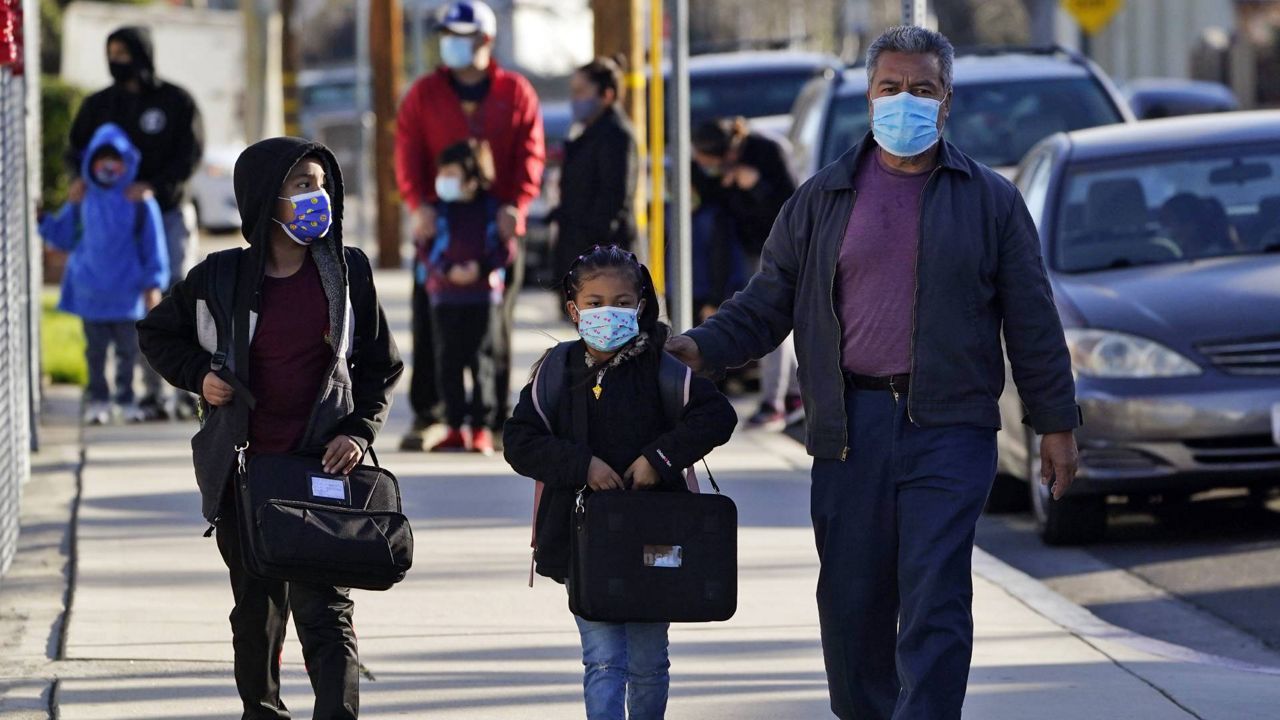LOS ANGELES (CNS) — Los Angeles Unified campuses are expected to begin reopening April 12, Superintendent Austin Beutner announced Monday, and the district soon will provide free COVID-19 vaccinations to family members who remain hesitant to return their kids to the classroom.
"Based on the progress we are making, it looks like we'll start opening the first group of schools the week of April 12," Beutner said, noting that the target date is for students to begin a phased-in return to schools for in-person learning at the elementary level.
What You Need To Know
- LAUSD campuses are expected to begin reopening April 12, Superintendent Austin Beutner announced Monday
- The district soon will provide free COVID-19 vaccinations to family members who remain hesitant to return their kids to the classroom
- Once open, elementary students in Los Angeles Unified schools will have the opportunity to attend for the full day, every day, Beutner said
- Students will remain engaged in online instruction if their parents decline to have them return to the classroom or if their parents don't respond to the survey
"Current plans are to reopen about 50 elementary schools and 10 early education centers that week. Any issues that arise can be addressed and everything we learn can be shared in advance of the reopening of all elementary schools and all early education centers the week of April 19," Beutner said. "Specific dates for the reopening of individual schools will be shared by the end of this week."
Once open, elementary students in Los Angeles Unified schools will have the opportunity to attend for the full day, every day, he said. Part of each day will be filled with in-person instruction and part of the day with one-on-one tutoring, recess, lunch and extra-curricular activities.
A similar phased-in reopening approach will be used for middle and high schools — with some limitations — later in the month, Beutner said.
Meanwhile, a survey of LAUSD parents showed that — as of Monday afternoon — only about half of families with children in elementary schools have indicated a preference for their child to return to school.
About 62% of LAUSD families have participated in the survey so far.
Students will remain engaged in online instruction if their parents decline to have them return to the classroom or if their parents don't respond to the survey, according to the district.
Based on those survey results alone, with no additional families filling out the survey and opting to attend school in the classroom, that would mean about 50% of elementary school students will return to schools in April, 35% of middle schoolers, and 26% of high schoolers, district officials said.
The greatest reluctance for a return to in-person learning is in the communities hardest hit by the virus, according to the survey.
"These also happen to be the same neighborhoods where families are struggling to get by and most likely to have someone who lost work due to the virus," he said. "Families in communities less impacted by the virus are planning for their children to return to in-person instruction at almost twice the rate of those in low-income communities which have been hardest hit by this crisis."
As a way to help give families some peace of mind, Beutner said the district is teaming with St. John's Well Child and Family Center to offer vaccinations for LAUSD family members at Abraham Lincoln Senior High School in East Los Angeles and George Washington Preparatory Senior High School in South Los Angeles beginning April 5.
"Vaccinating family members will help more kids to return to school as they can return to school without the fear of bringing the virus home," Beutner said.
"This is just a start — our 1,413 schools serve a diverse set of communities spread across more than 700 square miles. We should have dozens more school-based efforts like this to provide the access to vaccinations which are needed in the communities we serve."
St. John's Well Child and Family Center President and CEO Jim Mangia said: "Schools are really at the center of a family's life, and if you want to give access to healthcare services it had to be centered around the school."
WATCH: Superintendent Austin Beutner's Update to the School Community
— Los Angeles Unified (@LASchools) March 22, 2021
VEA: Mensaje del superintendente Austin Beutner a la comunidad escolar. Haga clic en el botón [CC] en el video si desea activar los subtítulos en español.https://t.co/xa24Tg11ah pic.twitter.com/dTfJQs1zZS



